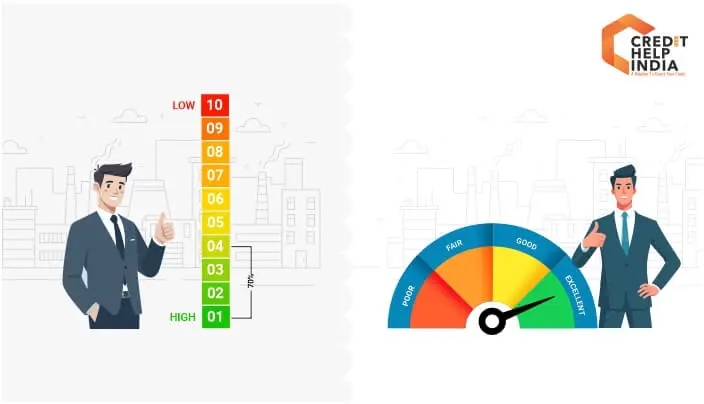Difference between business credit score and personal credit score

Introduction
There is a difference!
Personal credit score and business credit score are two completely different things!
Where a personal credit score gives insights into your trustworthiness as a borrower in a single number, on the other side when you are running your own business, you have a business credit score too which indicates your borrowing history as a business.
We can understand that it may be difficult to keep track of two scores, but two numbers are actually better than one. Yes, they are!
Your separate personal and business credit scores help you measure and compare your financial responsibility as an individual and as a business owner!
Quick note: Businesses with strong credit have better negotiating power.
Here’s a guide to what you need to know about personal vs. business credit scores.
What is a Business Credit Score?
A business credit score reflects as a numerical representation of a company's creditworthiness.
Business credit score is similar to a personal credit score but is particularly related to businesses. The score is generated by credit reporting agencies, and it reflects a company's credit history, financial behavior, and overall credit risk.
Key factors that influence a business credit score may include:
- Payment history
- Credit utilization
- The length of credit history
- Open line of credit
- New lines of credit
- Public Records
- Overall financial performance
How to Build a Business Credit Score?
1. Maintain a Good Payment History for Your Business
A positive payment history reflects your business's reliability in meeting financial obligations, Timely payments are fundamental to a positive payment history. Pay all bills, invoices, and credit obligations on or before the due date. Late payments can harm your credit score and will reflect a bad impression of your business in front of the lender while applying for the loan.
In addition: Business Loans witnessed 10% growth by value from FY21 to FY22.
2. Keep the Utilization of Credit Low
By keeping credit utilization low, you demonstrate to credit bureaus and lenders that your business is not overly reliant on credit, which can positively impact your credit score. A higher credit score will always lead towards better terms on loans, lower interest rates, and good access to credit. The general rule of credit utilization is 30%.
3. Understand Debt Obligations
The credit report will give an overview of all the liabilities on your credit report such as credit lines, other term loans, and credit card balances. If you take or apply for other loans without repaying the earlier ones will create an impact on your credit score. It is mandatory to check that before applying for a new business loan, your company should have repaid the other pending debt.
4. Do not Close old Credit Accounts
Non-banking financial companies prefer a long credit history as it helps them get a detailed view of your debt-repaying capability. Now, if you close an old credit account, your credit history will be lost, and its history cannot be included in calculating your credit score.
What is a Personal Credit Score?
A personal CIBIL score is a numerical representation of an individual's creditworthiness.
A CIBIL score is a three-digit number that is used by lenders, such as banks, credit card companies, and mortgage lenders, to assess the risk of lending money or extending credit to an individual.
Key factors that influence a personal credit score may include:
- Your payment history
- Repayment behavior
- Utilization of credit
- Types of credit in use
- The mix of credits ( Cards and loans)
How to Build a Personal Credit Score?
- Check Your Credit Report: Obtain a copy of your credit report from one of the credit bureaus in India.
- Establish a Credit History: If you don't have a credit history, consider starting with a secured credit card or a small personal loan.
- Use Credit Responsibly: Make small, regular transactions with your credit card and ensure timely repayments.
- Diversify Your Credit Types: Having a mix of credit types can be beneficial. Consider a combination of credit cards, and installment loans.
- Maintain Low Credit Utilization: Higher utilization of credit can negatively impact your credit score. Try to keep the utilization rate always below 30%.
- Avoid Multiple Credit Applications: Limit the number of credit applications you submit in a short period.
- Build a Long Credit History: The length of your credit history matters as it contributes positively to your credit history.
- Pay Bills on Time: Timely payments of utility bills, loan EMIs, and credit card bills are crucial.
- Manage Your Debt Responsibly: If you have existing loans, ensure that you manage them responsibly. Make consistent payments, and avoid defaulting on loans.
Did you know? 87% of the respondents have never delayed their loan payments while the rest 13% have delayed it.
What is the Difference Between a Business Credit Score and a Personal Credit Score?
| Key difference | Business credit | Personal credit |
|---|---|---|
| Purpose | Evaluates a business's creditworthiness for business loans, trade credit, etc. | Check and verify an individual's creditworthiness for personal loans, credit cards, etc. |
| Range of scores | Typically ranges from 0 to 100 or 0 to 300 | Typically ranges from 300 to 850 |
| Factors considered |
|
|
| Eligibility criteria | Credit history and creditworthiness are checked but a business credit is usually more strict than for a personal credit card. | Credit history and creditworthiness but a personal credit is quite liberal in comparison to business credit. |
| Responsibility | Reflects the creditworthiness of the business as a separate entity | Related to an individual's financial behavior |
Statistics: Personal Loans witnessed 46% growth in Originations (by value) and 2.2X growth in Originations (by volume) from FY21 to FY22.
Conclusion:
In final words, the distinction between a business credit score and a personal credit score lies in their purpose, entity assessed, factors considered, and impact on borrowing. While both scores serve to evaluate creditworthiness, they apply to different contexts and are associated with different entities—individuals in the case of personal credit scores and businesses for business credit scores.
FAQs:
1. Is a personal credit score required for Business Loan approval?
Answer: Most commonly, lenders will consider your personal credit score as one of the data points they consider when they review your business loan application.
2. What personal credit score is needed for business credit?
Answer: A personal credit score above 721 is required.
3. When do you require a decent personal credit Score for business financing approval?
Answer: When you apply for a personal or mortgage loan to utilize those borrowed funds for commercial purposes, your personal credit score will be taken into consideration.
4. When do lenders check both personal and business credit scores?
Answer: Lenders may check both personal and business credit scores when a business applies for a line of credit. This helps lenders evaluate the creditworthiness of both the business entity and its owners.


